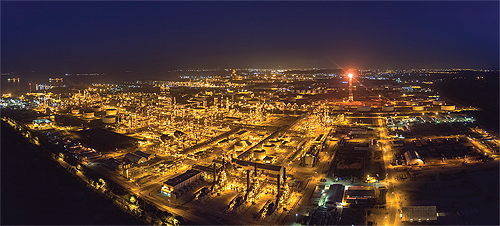Cartagena Refinery
Clean fuel for national growth
At the end of the 1990s, the Government of Colombia came to a realisation that the country needed to improve its refining capacity, and that the national and international fuel demand required more efficient and environmentally-friendly products. A decision was made to expand and modernise the Cartagena Refinery, which led to its increased capacity of 150,000 barrels per day.
“Based on sales, we were the seventh largest company in Colombia in 2018 and our contribution to the country’s fuels market was quite significant – we now have a 34 per cent share in diesel and 23 per cent share in gasoline. More important still, the fuels produced by our refinery are the cleanest in Colombia’s history. Our diesel has less than ten ppm sulphur content and as to the gasoline, it is between 50 and 60 ppm, which means that we meet and exceed the most demanding national and international standards,” discusses Cartagena Refinery’s General Manager, Walter Canova.
The refinery’s hydrocracking unit is indisputably the complex’s key facility. It has adopted state-of-the-art technology to convert heavy products, such as gas oils from the vacuum section of the  crude oil unit and light cycle oil (LCO), into products with much higher commercial value. “Using hydrogen and catalysts, the plant removes the sulphur content to obtain clean products of high demand in the market, thus helping us increase our efficiency and profitability,” Walter points out.
crude oil unit and light cycle oil (LCO), into products with much higher commercial value. “Using hydrogen and catalysts, the plant removes the sulphur content to obtain clean products of high demand in the market, thus helping us increase our efficiency and profitability,” Walter points out.
“Another key processing unit for the refinery is the delayed coker, which allows the conversion of crude oil’s heavy piece into high-value products and petroleum coke – a by-product that has been obtained for the first time in Colombia. It is a solid fuel of high calorific value that is used to generate electricity, as well as in the cement, steel, and aluminium industries.
“Furthermore, the delayed petcoke plant produces fuel gas, liquefied petroleum gas (LPG), naphtha, and gas oils that, after moving through the diesel hydrocracking and hydrotreater units, produce cleaner fuels like gasoline and ultra-low sulphur diesel,” he continues. “I would also highlight the HF alkylation and butamer units, which are the first of their kind in Colombia, enabling the production of high-octane gasolines to complement the refinery’s portfolio. In addition, the aforementioned two diesel hydrotreater units for diesel production of less than ten parts per million of sulphur were designed in compliance with the highest safety and reliability standards, allowing an efficient operation.”
Despite the recent major expansion of the refinery, more plans for the further increase of its capacity are being advanced at the moment. Walter reveals that an interconnection project regarding the crude unit of the original refinery is being developed. “If completed, the complex will experience a 30 per cent capacity expansion, providing us with the capability to process more than 200,000 barrels per day. The project must undergo three study phases, of which two have already been finished and, currently, technicians from our parent organisation – Ecopetrol, are carrying out financial and engineering feasibility studies to establish the schedule and investment costs.”
Emerging opportunities
Having mentioned Ecopetrol, it is worth adding that Cartagena Refinery has been part of Colombia’s most important group since 1974. Walter explains the benefits the business sees from being a subsidiary of the country’s national oil company. “For Cartagena Refinery, being under Ecopetrol’s wing represents the possibility of maximising the use of its refining assets and know-how, generating efficiencies and logistics, operational, and cost synergies. What is more, we can take advantage of working within an integrated group that adheres to the highest international standards in our field.”
Thanks to Cartagena Refinery, in 2018, Colombia saved more than $2 billion – a sum, which was otherwise going to be spent on importing fuels from abroad. This achievement is a clear indicator of the strategic importance of the refinery’s modernisation and Walter hopes that it will continue to capitalise on the emerging opportunities in the coming years. “Under the MARPOL Annex VI legislation, maritime ships will have to use fuels with lower sulphur concentrations from 1 January 2020 and this is a change that puts us in a good position, because the ultra-low sulphur diesel we produce, will have a higher value in the international market. It will either be used as a replacement of the high-sulphur fuel oil or will be mixed with fuel oil to reduce the sulphur content of fuels consumed by vessels and help them meet the new requirements.
“Our goal is to be a reference point in the refining industry of the Americas by achieving outstanding results against a range of KPIs and ensuring that our operations are safe, reliable, and environmentally-friendly,” Walter declares. “We want to produce cleaner fuels and, ultimately, contribute to the improvement of the quality of life of Colombians, as well as of the nationals in the countries our products are exported to. To achieve this, we will direct our efforts towards strengthening the three key pillars of our business – safety, health, and environment; reliability; and efficiencies in margin and cost. We recognise these as the most important areas that will secure the long-term sustainability of the organisation, increase our profitability, and allow us to offer betterquality products to Colombia and the entire world,” he concludes.
Cartagena Refinery
Services: Fuels production